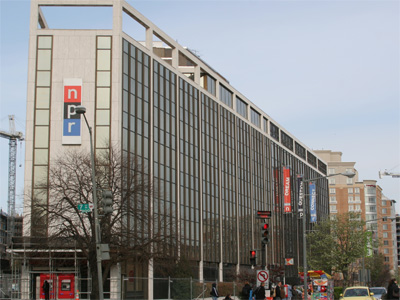
The head of National Public Radio is taking a hike after a series of running battles with its Board of Directors. Juicy details — at least for Public Radio junkies — are in several locations.
Ken Stern’s primary crime, according to the Washington Post, is the expansion of NPR’s new media initiatives, which “riled station managers.” Allow me to translate: “We’re radio. What do we get out of this?” Do they have a point? There was a time when npr.org‘s purpose was to be an archive site for its radio offerings, which wouldn’t be put on the site until the last broadcast had cleared the Pacific Time Zone. Most local stations don’t get anything significant from npr.org. Compounding the problem may be a measure of “independence” NPR got by virtue of inheriting a fortune from former St. Paulite Joan Kroc.
Now, the organization has a fully functioning real-time site, and that helps local radio stations, how?
Rafat Ali at PaidContent.org says the tension between NPR and its affiliates was also evident a week or so ago at the Integrated Media Association conference, a gathering of mostly Web people from Public Radio stations.
The other issue which I learned about was the tension in the relationships between the top organizations like NPR and PBS, and the local affiliates, very much on the lines of what’s happening in the network TV industry (only in the former case, “revenues” get replaced by “funding”). These tensions are of course related to digital media, and who will lead the efforts, and how should they be presented. From what I heard, organizations like NPR and PBS are arguing that there should be a centralized aggregation effort, a bit like a destination site…while the affiliates resist these moves and want to make their own local sites as the destination sites.
That’s the problem Stern had, even as he doubled NPR’s audience. It’s also the problem his successor will face. Dennis L. Haarsager, NPR’s chairman, is that successor and he suggested to the New York Times that the squabble may not be over. He said he supported Stern’s emphasis on digital conversion, but “I don’t think everybody in the system would agree with him on that.” Haarsager’s memo to NPR staff is here. Haarsager says Stern’s leaving wasn’t over the digital issue, though, calling it “multidimensional,” without explaining what that means.
Haarsager, who’s a tech blogger and a native of Minnesota and South Dakota, has got quite a problem on his hands. Like newspapers, the radio industry is often torn between those who believe what’s worked in the past is what will work in the future, and those who believe there’s a media landscape that has to be acknowledged.
(Photo: Wikimedia)
